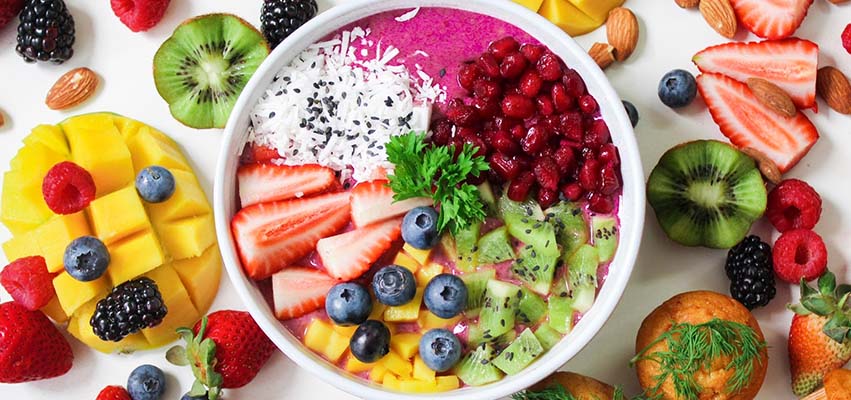Boost Your Immune System with Healthy Food

When it comes to eating the right foods to boost your immune system, it can be as easy as the ABCs. According to Kaela Ketcham, a clinical dietitian with OSF HealthCare Saint Francis Medical Center, vitamin A, beta carotene, vitamins C, D, E and zinc make up the alphabet for boosting your immune system. Getting the recommended daily allowance (RDA) of those vitamins and nutrients will help keep you healthy.
Vitamin A
Vitamin A helps with the immune system as a whole and in the functioning of the heart, lungs, kidneys and other organs. It can be found in eggs and fish. The RDA is 700 micrograms for females and 900 micrograms for males. Examples:
- 1 cup yogurt: 32 micrograms
- 3 oz salmon: 60 micrograms
- 1 egg: 75 micrograms
Beta Carotene
Beta carotene goes hand-in-hand with vitamin A. “It’s called a provitamin and just becomes vitamin A as the body needs it,” Ketcham adds. Foods high in beta carotene include a variety of plant-based food. Although there is an RDA for Vitamin A, there is no RDA for beta carotene. Examples:
- ½ cup raw carrots: 460 micrograms
- ½ cup cooked spinach: 570 micrograms
- 1 sweet potato: 1,400 micrograms
Vitamin C
Vitamin C aids in healing and boosting the immune system. Foods high in Vitamin C include citrus fruits, berries, peppers and broccoli. The RDA is 75 milligrams for females and 90 milligrams for males. Examples:
- ½ cup cooked broccoli: 50 milligrams
- ½ cup strawberries: 50 milligrams
- 1 medium raw orange: 70 milligrams
- ½ cup raw bell peppers: 95 milligrams
Vitamin D
Vitamin D helps boost the immune system and aids our bones. It is not as common in foods, but can be found in fatty fish, eggs and fortified foods—including milk, cereal and juices—in which vitamin D has been added to the product. The RDA is 10 micrograms for infants up to age one, 15 micrograms from age one to 70, and 20 micrograms for those over age 70. Examples:
- 1 egg: 1 microgram
- 1 cup milk: 3 micrograms
- 3 oz salmon: 14 micrograms
“Vitamin D comes from the sunshine, too,” Ketcham adds. “It’s suggested that five to 30 minutes of exposure to the sun (to the face, arms, legs or back) twice a week would be enough to provide what your body needs.”
Vitamin E
Vitamin E is helpful with the immune system and can be found in nuts, seeds and oil. The RDA is 3-6 milligrams (ages 1-3), 7 milligrams (ages 4-8), 11 milligrams (ages 9-13) and 15 milligrams (over the age of 14). Examples:
- 1 tbsp soybean oil: 1 milligram
- 1 tbsp corn oil: 2 milligrams
- 2 tbsp peanut butter: 3 milligrams
- 1 tbsp sunflower oil: 6 milligrams
- 1 oz almonds or sunflower seeds: 7 milligrams
Zinc
“Zinc does a lot of different things with cells, but it also helps with the immune system and in healing,” Ketcham notes. Zinc can be found in meat, dairy products and grains. The RDA is 3 milligrams (ages 1-3), 5 milligrams (ages 4-8), 8 milligrams (ages 9-13), 8 milligrams (females age 14 and older) and 11 milligrams (males age 14 and older). Examples:
- 1 cup low-fat milk: 1 milligram
- 3 oz pork chop: 3 milligrams
- 3 oz chuck roast: 7 milligrams
“A lot of the vitamins you need are in different foods,” Ketcham adds. “That’s why it’s important to get a wide variety of food groups in your diet each day.” Don’t miss out on these six essential nutrients to boost your immune system! It’s as easy as the ABCs. PM
